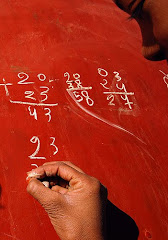If you could look into any of my childhood classrooms you would undoubtedly see chalkboards and erasers, over sized compasses and protractors, colored chalk and yard sticks, children in rows, note and text books open. The teacher would be stationed at the front explaining that days lessons with examples and diagrams. Work set and children expected to complete it independently if they had listened properly. My math autobiography is probably very similiar to many of the people who struggled their way through the school system of the 70's ( okay 60's and 70's). To be fair, I do not recall very many specifics of 'what math looked like', particularly in the younger grades, but those I do are not positive memories.
Which is strange because at the time of the kindergarten registration, I can clearly remember being excited about the puzzles and books and the big fat red pencils we would be using. I also remember seeing colored beads of different shapes strung together and wanting to be able to play with the items I could see sitting in an open cupboard not far from where I sat next to Mom. I don't know when that feeling of excitement about school disappeared but it didn't take long. When Sir Ken Richardson was talking about 'being educated out of creativity' on the video we watched during the first class it resonated with me.
I do remember in grade 2 being hit on knuckles ( over and over) with a ruler for getting my 'sums' wrong and being frightened and confused because it was not clear to me what I was doing wrong. Otherwise I just recall that math was something I found hard and confusing and a real challenge to understand, and then came grade 6. Grade 6 has the distinction of holding both my best and worst math memories. The best was a lesson on fractions that included a recipe for a cherry cake, which I went home and made and brought to school. It was the only time all year I felt I had pleased the teacher. She always seem to be moving too fast and seemed to only have time and patience with the smartest kids in class. I was definitely not one of those in fact I was coming to the conclusion that I must be stupid and that feeling was about to get stronger.
Pardon me while I digress for a moment buy I feel I should explain that the education system in Newfoundland at the time tracked students according to ability. The A class having the students of highest ability who would get mostly 80- 100% . B class had students who would most likely achieve in the 70-80% range I guess and I had always been in this group.
At the end of grade 6 the teacher approached me about being moved to the C group in grade 7 because of math. It was quite a blow to my self esteem and cemented in me the notion that I indeed could not do math and thus is probably the worst math memory I have. It didn't' matter that they moved me back to the B class in grade 8, it was too late I had already joined the ranks of the ' I can't do math society" a subsidiary of the " I hate math foundation".
That change in outlook lasted until my first year university when I had my epiphany regarding math. I had registered for the first level math course and was struggling ( I had been out of high school for 5 years before starting at MUN) . When I asked the professor for help she told me that if I didn't understand it I should drop the course and take the foundation math course which was noncredit. Well it was past the drop/add deadline and I couldn't afford to take this course again. Failing was not an option! So before the first exam I went to the library and booked one of those little study rooms. I tried to do the problems we had worked on in class, but always found myself getting the same wrong answer. The frustration would build and I can still see myself slamming books down and flipping pages wildly, stamping out of the room with a " I can't do this" sense of fatalism. Then I'd make myself go back and try again and a strange thing happened on the way to giving up, a light went on. I figured out what I was doing wrong. What elation, what a feeling of accomplishment what a change in my view of math! Math was I realized something I could do if I was willing to work long and hard. Not knowing the answer right away no longer meant "I can't do this" it meant that I had to keep working.
Giving up was the way I had always faced math. Math teachers in general didn't give me a lot of time, and it felt as if they seemed to agree that I was beyond help and so very little was ever given ( although to be honest this was more of subconscious feeling) . Except in grade 10 when I had a math teacher who expected me to work hard, who checked to see if my homework was done, who kept me after to class to grill me if it wasn't and who called on me to answer questions as regularly as he did anyone else. This feeling of having to live up to his standard was in equal parts frustrating and motivational. He was the best! The fact that he took his time, that he actually looked at the class when asking if anyone needed help instead of having his back to the room while erasing the board were all factors in making him stand out as a good math teacher. He loved the subject and he liked us and everyone knew it.
This could not be said about any of my other high school math teachers. Assignments usually consisted of pages of repeated practice problems. Similar to regular math homework but printed in hand on a mimeographed sheet. Assessment consisted of marks given for end of unit tests, some small weight given for homework completion, assignments were marked and of course the ubiquitous mid-term and final exams. Summative evaluation was the norm for all the years I was in school and was entrenched as the way things were done. This pattern continued into university through the 4 math courses I took while there. The courses at university consisted of the two first year entrance level courses, Primary/ Elementary Math 1 and 2 and the Math Methods course. I may have had that epiphany but I still didn't actually like math.
So it continued, I taught math in many grades as a substitute and replacement teacher and felt I was doing a good job. I did what all the other teacher seemed to be doing, what my teachers did. I taught, they listened, they set to work on problems. This was how it was until they brought in a new math program and it made its way to grade 5 several years ago. It was a totally new approach to teaching and assessing students. Assessment became multi-layered and the problem solving approach to mathematics was de rigeur. What horror, oh the complaining and gnashing of teeth in the staffroom. I struggled to make sense of it while clinging to the ways I had always taught. But the struggle became to big and I gave myself over to change. I have put in a tremendous amount of time into changing my approach to the teaching of math and I can see the difference this program has made to so many students. Having said that I must add that in my opinion no one approach can meet all the needs. Differentiation sounds like it may hold the key and is something that I have included in my professional growth plan. These changes in my attitude have developed over a good many years. I have gone from hopeless to hopeful. I feel that mathematics can be an exciting and rewarding experience for all students. While I struggle to make it so, I know that time and effort pays off and perserverence is the name of the game!
Video Links Have Been Moved!
Tuesday, September 15, 2009
Subscribe to:
Comments (Atom)

